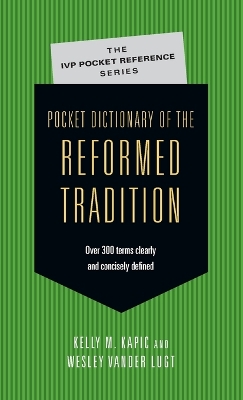The IVP Pocket Reference
1 total work
Pocket Dictionary of the Reformed Tradition
by Kelly M. Kapic and Wesley Vander Lugt
Published 2 May 2013
Beginning to study Reformed theology is like stepping into a family conversation that has been going on for five hundred years. How do you find your bearings and figure out how to take part in this conversation without embarrassing yourself?
The Pocket Dictionary of the Reformed Tradition takes on this rich, boisterous and varied tradition in its broad contours, filling you in on its common affirmations as well as its family tensions. Here you will find succinct and reliable entries on
And much more.
The Pocket Dictionary of the Reformed Tradition is ready to assist you over the rough parts of readings, lectures, conversations and blogs. It will also be a companionable and concise introduction to one of the great Christian traditions.
Designed for students and pastors alike, the short and accessible volumes in the IVP Pocket Reference Series will help you tackle the study of biblical languages, church history, apologetics, world religions, Christian spirituality, ethics, theology, and more.
The Pocket Dictionary of the Reformed Tradition takes on this rich, boisterous and varied tradition in its broad contours, filling you in on its common affirmations as well as its family tensions. Here you will find succinct and reliable entries on
- Latin terms, such as ad fontes and sola fide
- Theologians, from Calvin to Torrance
- Confessions, such as the Belgic and Westminster
- Doctrines, such as atonement and sanctification
- Apologists, such as Francis Schaeffer and Cornelius Van Til
And much more.
The Pocket Dictionary of the Reformed Tradition is ready to assist you over the rough parts of readings, lectures, conversations and blogs. It will also be a companionable and concise introduction to one of the great Christian traditions.
Designed for students and pastors alike, the short and accessible volumes in the IVP Pocket Reference Series will help you tackle the study of biblical languages, church history, apologetics, world religions, Christian spirituality, ethics, theology, and more.
